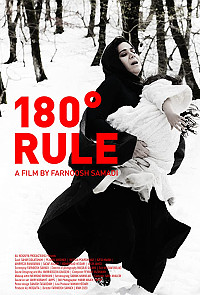| SHADOWS ON THE WALL | REVIEWS | NEWS | FESTIVAL | AWARDS | Q&A | ABOUT | TALKBACK | |||||||||||||||||||||
 Shadows off the beaten path Shadows off the beaten pathIndies, foreign, docs and shorts...
On this page:
HONEYMOOD |
180° RULE |
THE WANDERINGS OF IVAN
| |||||||||||||||||||||
| See also: SHADOWS FILM FESTIVAL | Last update 8.Oct.20 | |||||||||||||||||||||
|
Honeymood Review by Rich Cline | 
| |||||||||||||||||||||
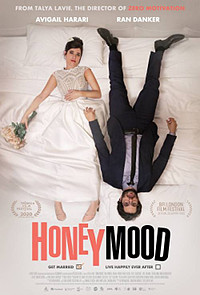 dir-scr Talya Lavie prd Eitan Mansuri, Jonathan Doweck with Avigail Harari, Ran Danker, Meir Swissa, Orly Silbersatz, Yael Folman, Elisha Banai, Ana Dubrovitzky, Byan Anteer, Rubi Moskovitz, Irmy Shik Blum, Yair Tzabari, Yaniv Goldman release US Apr.20 tff, Isr Jun.20, UK Oct.20 lff 20/Israel 1h29  Is it streaming? |
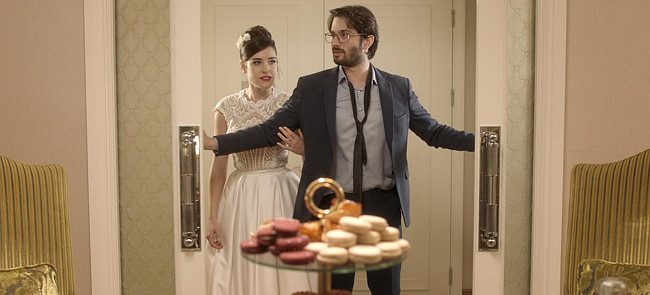 Set over one long night, this Israeli romantic-comedy superbly navigates a range of earthy emotions as a couple faces the first hours of their marriage. It's an entertaining, surprising film, shifting from funny to thoughtful as it explores issues of relationships and interconnections from a variety of resonant angles. The plot meanders and is sometimes a bit too pointed, but it's both engaging and provocative. After their wedding in Jerusalem, Elinor (Harari) heads to the lavish honeymoon suite with new husband Noam (Danker). But their playful mood abruptly ends when Eleanor finds an envelope from Noam's ex Renana (Folman) containing a cheque and a ring. Curious and annoyed, Elinor insists that they return it in the middle of the night. And Renana isn't at home, perhaps hooking up with Elinor's ex Michael (Banai) at the wedding. When they find Michael alone, he ropes them into watching his film school project. And the night only gets increasingly surreal and provocative. A witty cautionary tale about inviting former lovers to your wedding, the way this couple's happiness suddenly turns tense is skilfully written and played. Eleanor and Noam use their words carefully, turning conversations on each other to reveal petty rivalries and also deep affection. This night definitely hasn't gone the way they imagined it would, but Elinor reminds Noam that he likes her crazy sense of adventure, doesn't he? Over these hours, each of them will have a chance to think carefully about their decisions, what they want in life and what they already have. Performances are relaxed and realistic, nicely understating the comical elements while maintaining messy but sympathetic characters. The narrative gives everyone a hapless quality, which adds interest as the night keeps taking unexpected turns. Both Harari and Danker are excellent, developing strong chemistry while creating sparky individuals. So they're just as much fun to watch together as in their separate adventures. And the surrounding characters are just as amusing, and also astutely well-played. Filmmaker Lavie has a superb light touch, sending scenes in some foreboding directions while reminding the audience everything will be fine, no matter what might happen along the way. A musical dance sequence adds a lovely whiff of fantasy, while an encounter with a suicidal woman offers a darker perspective. There are a couple of misunderstandings at the centre of the plot that are rather annoying, leading to a rather outrageous climax and a clever conclusion for two people who clearly don't want to be ordinary.
| ||||||||||||||||||||
|
180° Rule Review by Rich Cline | 
TORONTO FILM FEST  Is it streaming?
| 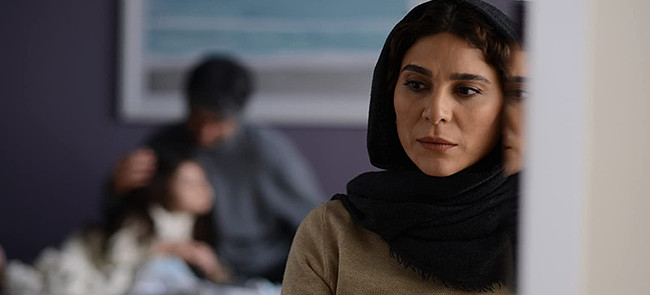 This drama vividly highlights the lack of power women have in Iranian culture. It's a gripping story, beautifully well-told to explore the issues without preaching, even though it's precisely clear what is so drastically wrong. With her first feature, writer-director Farnoosh Samadi skilfully explores a situation in which a seemingly easy decision becomes bleakly momentous. It's somewhat melodramatic in its approach, but the film carries a strong wallop. In Tehran, schoolteacher Sara (Dolatshahi) is preparing to attend her sister's wedding out of town. But her husband Hamed (Jamshidi) has a last-minute work trip and, since 5-year-old daughter Raha (Jahed) is recovering from a fever, he forbids her to go. But once he leaves, Sara decides to attend the event anyway, joining her lively, loving family. She knows that defying Hamed will have consequences, but nothing can prepare her for what happens next. In painful desperation, she concocts a plan that can't help but go wrong, leaving the entire family on a precipice. Hamed's controlling aggression is both overt and microscopic, and it's present in everything he says to Sara. She's annoyed by how pleased he is to think she always does whatever he orders her to. And her situation is echoed in the helplessness of a student who is suicidal because she knows her parents will reject her for getting pregnant. Oddly, this issue seems almost incidental as the plot takes its major turn, piling overwhelming guilt on Sara for her disobedience. And where it goes is harrowing and haunting. These earthy, natural actors swing through some very wide-ranging emotions as the events escalate. Dolatshahi is excellent as a smart, compassionate woman thrown into unimaginable anguish. She sits in stunned silence for most of the film's second half, and still commands the screen. And Jamshidi just about makes Hamed more than a controlling villain. More engaging are Hajian and Pourshirazi as Sara's parents, and Ranjbaran as her brother, who go far beyond the call to support her. The title refers to the filmmaking rule about only shooting from one side of a scene. This may echo the fact that, even with the blurred lines of morality that run through this story, there's clearly a right and wrong way to respond. The law gives Hamed the right to demand unflinching compliance from his wife, and perhaps that's a bigger problem than anyone is willing to admit. And it's certainly not only Iran that has a problem when it comes to the lack of options for people who are marginalised and oppressed.
|
| The Wanderings of Ivan La Balade d’Ivan Review by Rich Cline | 
| 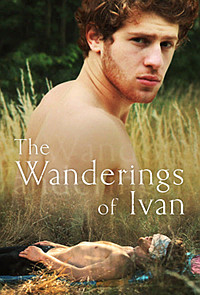 dir Claude Chamis prd Sylvain Maugens scr Claude Chamis, Sylvain Maugens with Aram Arakelyan, Benjamin Baclet, Franck Zerbib, Camille Freychet, Corine Watrin, Pablo Alarson, Yves Balmes-Morgan, Paul Bettinger, Maylis de Poncins, Lisbeth Wagner, Noe Alarson, Judith Journo release Fr 27.Nov.19, UK 5.Oct.20 18/France 1h14 Is it streaming?
| 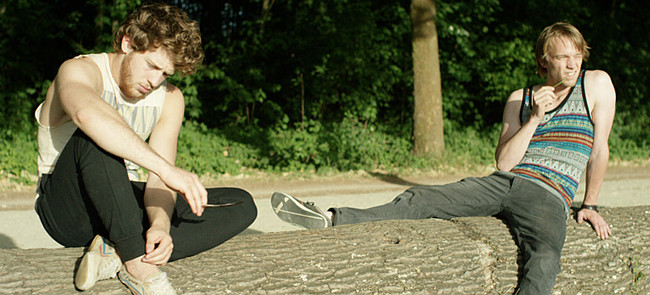 This loose tale of a foreigner adrift in France becomes an introspective study of migration, touching on how selfish the world has become when it comes to strangers. As a portrait of someone falling through the cracks, the film has power on several levels. It's low-key and observant, full of earthy details. So even though the narrative becomes somewhat arch in the final act, it offers plenty to think about. A Russian in Paris, teen backpacker Ivan (Arakelyan) has nowhere to live, roaming the streets looking for anyone who will help him. Since most people either dismiss or ignore him, he heads into a forest where he can get some peace. He meets the rentboy Ben (Baclet), who tells him he could make money selling himself to men in the park, although the other boys feel he's invading their space. He has brief connections with a couple of women (Freychet and Watrin), and then Pierre (Zerbib) takes an interest and pushes him further. Ivan's inner monolog echoes in voiceover, sometimes in un-subtitled Russian, as he remembers life before coming to Europe, with happy memories even from more difficult periods. Filmmaker Chamis shoots this with an artful, fly-on-the-wall sensibility, juxtaposing this fit young man in a range of settings that are intercut with nature's textures and patterns. All of this paints a vivid picture of desperation, including earnest prayer and resorting to robbery. Plus the sense that Ivan doesn't know what he wants. Arakelyan has a magnetic presence. Even when he's just staring blankly, there's a soulful flicker flicker in his eyes and a sexy bounce to his physicality. And his actions have a tenderness to them, something those he encounters never take the time to see. Ivan is on a deeply internalised journey into his own identity, trying to understand how he got to this place where he's simply existing without purpose. The other people on-screen remain largely undefined, merely hinting at their own stories. This is a wistful, often meditative film, meandering through micro-adventures and punctuated by resonant passages from a book by philosopher Maurice Blanchot. When the story takes a sudden dramatic turn, the themes begin to blur, provoking a very different set of thoughts and feelings. This intrusion of structure, plus some more overt metaphorical plotting, provides the film with a more distinct sense of direction, even as the meaning becomes more elusive. It's a haunting film with an eerily engaging emotionality to it.
| 
See also: SHADOWS FILM FESTIVAL © 2020 by Rich Cline, Shadows
on the Wall
HOME | REVIEWS | NEWS | FESTIVAL | AWARDS
| Q&A | ABOUT | TALKBACK | | ||||||||||||||

